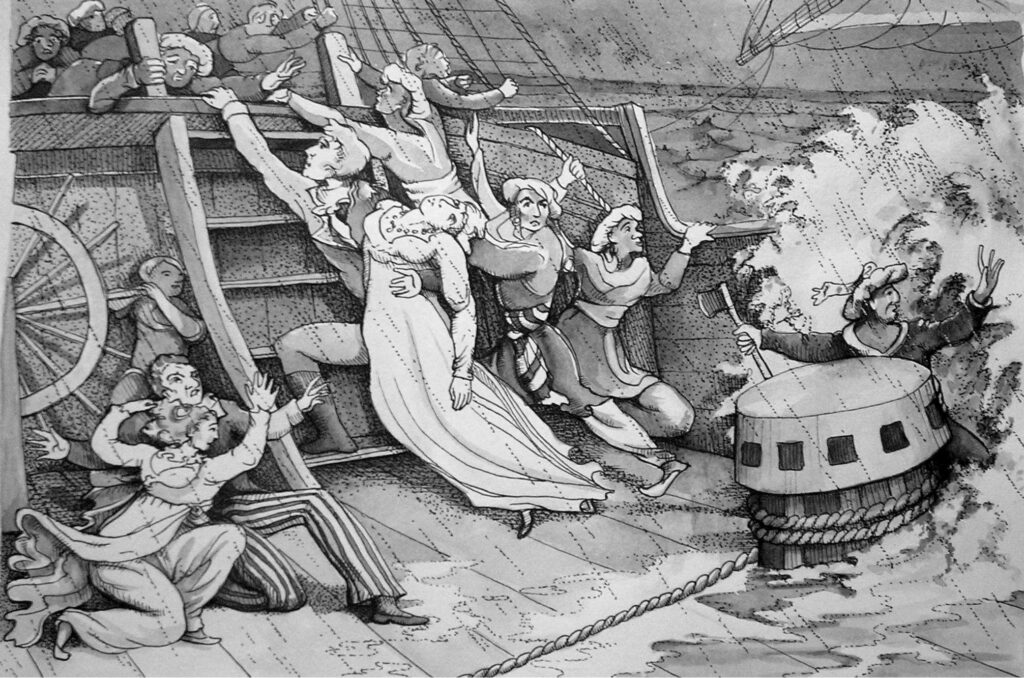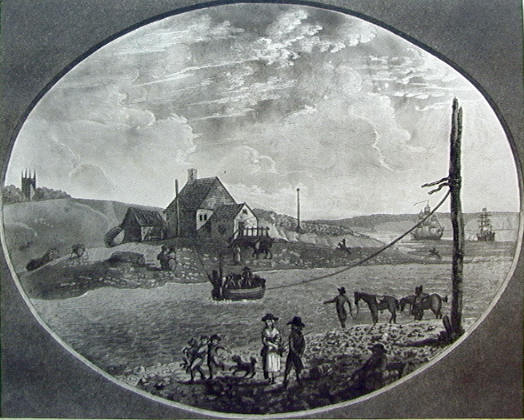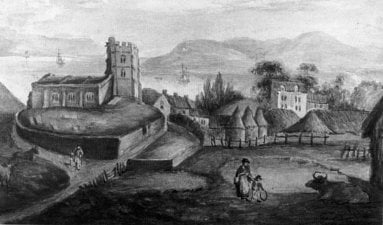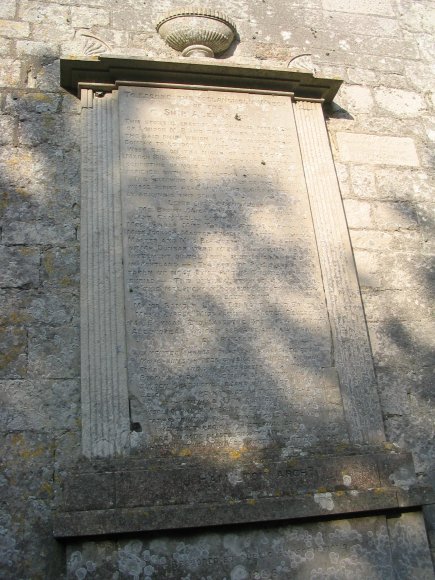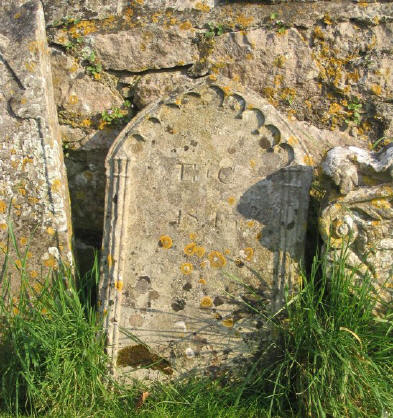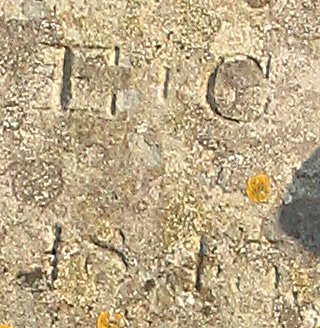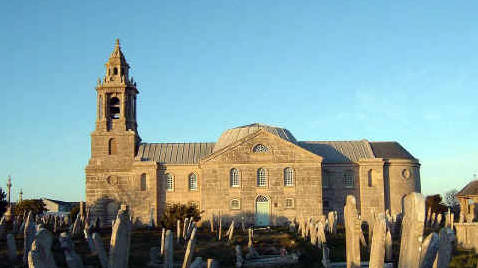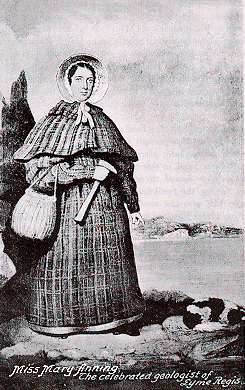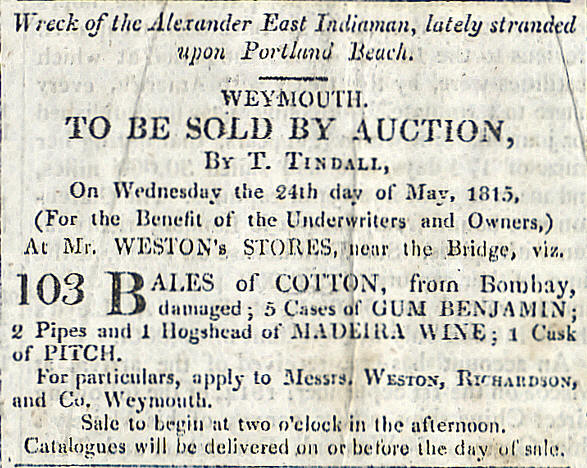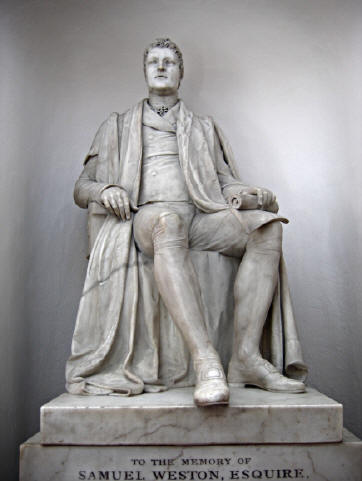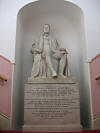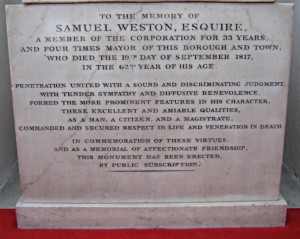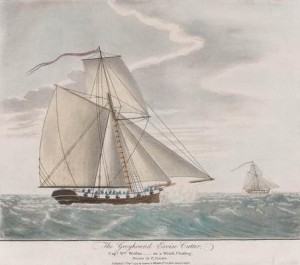Print attached to the Narrative. Re-mastered from the original by Semi Vine.
The Alexander was the third (known) English East Indiaman wrecked off the Dorset coast. The Alexander was not a regular East India Company vessel, but a Bombay trader hired on Company business; what they call a ‘Bombay Country Ship. [1] It was a ship of 746 tons owned, according to the British Library records, by a man called T. Pavin [2]and captained by a man named Lewis Auldjo. This particular Alexander is listed in the East India Register for 1813, 1814, and 1815 as a merchant ship belonging to the port of Bombay for ‘Private Trade’.
The first record of this, her last voyage, comes from the Nautical Chronicle and Naval report in the Bombay Courier of the 22nd October 1814; See above.
“BOMBAY
Sailed – 15th (October) Ship, Alexander, Captain L. Auldgo, to London.
PASSENGERS PER ALEXANDER
Mrs Auldgo. [3] Doctor and Mrs Dunbar. Miss Toriano. Major Ramsey. Capt. Campbell, H. M. 47th Regiment. Lient. and Mrs Deverell, H. M. 47th Regt [4]. Lient. Wade. Lient. Baker. Lient. Bennet. Lient Godby.
CHILDREN
Miss Charlotte Elphinstone. Master John Elphinstone. Master Wm. Richard Russell. Master Edmund Deverel. Miss Lydia Deverel. Miss Frances Deverel.
Thomas Mathews, Invalid from the Artillery.
Captain and Mrs Hughes and family of the Madras Establishment are expected also to go as passengers from Cochin.”
The voyage of approximately 13,000 miles had taken 155 days; this would have included a stop at Cochin, mentioned above, and probably at least a second stop in the Azores for some private trade, because as you will see there was a considerable amount of Madeira wine recovered from the wreckage.
This wreck like many is the classic case of ‘so near yet so far’ foundering as it did on the notorious Chesil Beach near Wyke, Dorset. Considering it was one of the worst single losses of life on the Chesil Beach the information about this wreck, particularly the final hours, is surprisingly limited. The main reason is probably due to the fact that all the educated and fluent English speakers on board died. A very different situation to that of the Halsewell and Earl of Abergavenny where there were a significant number of well educated survivors who gave detailed eye witness reports, resulting in the publication of lengthy narratives. It also differs in the fact that it was an ‘Inward’ rather than and ‘Outward’ bound vessel.
Sadly, although there is a narrative of the loss of the Alexander, it consists of only one page, with the limited information probably taken from the press reports. So brief is it in fact, it was combined with another called “The Distresses and Exertions of M. Pierre Viaud and Mad. La Couture” [5]
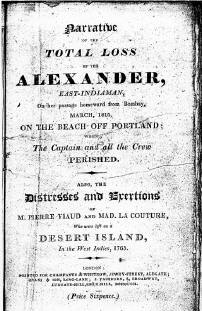 “THE fine ship, whose loss we have now to relate had made a prosperous and easy voyage from Bombay to this country, in sight of which she came at the latter part of March; but was for some time baffled and blown off by severe gales during the month. However, the captain and officers thought all secure, till the fatal morning, when so tremendous a storm came on at west, that all their efforts were in vain to prevent the ship from striking about two miles west of Portland, on the beach. No diminution of the storm took place till the ship was completely beat to pieces, and but four lascars and a female reached the shore. The captain , officers, passengers, and crew, all perished. Several officers returning from India, with their wives and children were on board, and their distresses and cries added to the horrors of the dismal scene; one affecting incident is portrayed in the engraving prefixed to this sketch, of a gentleman of fortune endeavouring to rescue his lady from rising fury of the waves, which had parted the ship, and were rapidly reaching the highest parts of the wreck; and here the unfortunate sufferers witnessed the approach of their inevitable fate, which in a few minutes consigned them all to the bed of the ocean. Captain Ugle (Auldjo) and his brave associates exerted themselves to the last, as became British seamen; but their efforts unfortunately were of no avail. The bodies of many of the sufferers reached the shore and were decently buried, as soon as possible; some of the cargo was also saved, but the loss was very considerable to the owners and merchants.” [5A]
“THE fine ship, whose loss we have now to relate had made a prosperous and easy voyage from Bombay to this country, in sight of which she came at the latter part of March; but was for some time baffled and blown off by severe gales during the month. However, the captain and officers thought all secure, till the fatal morning, when so tremendous a storm came on at west, that all their efforts were in vain to prevent the ship from striking about two miles west of Portland, on the beach. No diminution of the storm took place till the ship was completely beat to pieces, and but four lascars and a female reached the shore. The captain , officers, passengers, and crew, all perished. Several officers returning from India, with their wives and children were on board, and their distresses and cries added to the horrors of the dismal scene; one affecting incident is portrayed in the engraving prefixed to this sketch, of a gentleman of fortune endeavouring to rescue his lady from rising fury of the waves, which had parted the ship, and were rapidly reaching the highest parts of the wreck; and here the unfortunate sufferers witnessed the approach of their inevitable fate, which in a few minutes consigned them all to the bed of the ocean. Captain Ugle (Auldjo) and his brave associates exerted themselves to the last, as became British seamen; but their efforts unfortunately were of no avail. The bodies of many of the sufferers reached the shore and were decently buried, as soon as possible; some of the cargo was also saved, but the loss was very considerable to the owners and merchants.” [5A]
NOTES & REFERENCES:
[1] – The standard book on these vessels is “The Bombay Country Ship’s 1790 to 1833” by Anne Bulley, published by Curzon, 2000.
[2] – There appears to have been two owners of the Alexander when she was wrecked at Portland, according to the Plaque at All Saints, Wyke. “CHARLES FORBES ESQ. OF LONDON MP.” and “THE OTHER OWNER OF THE SAID SHIP”.
[3] – There is a reference BL-OIOC Ref: N/1/9/f.226 referring to the marriage of Lewis Auldjo as having married in Calcutta on the 26th November 1815?? a lady named Elizabeth Cook. An interesting reference but the date of 1815 must be incorrect.
[4] – The memorial shows ‘Deverel with only one ‘l’.
[5] – Although not clear from the pamphlet itself it appears from the Hanson Collection archive that it was written by Thomas Allom with the print by William Henry Barlett. Although in very poor condition, it is quite clear that the print refers to the wreck of the Alexander.
[5A] – Narrative Courtesy of Cambridge University Library. Sketch/Clarification of the original print by Semi Vine.
AFTERMATH
The first official notification of the tragedy appears in a letter No. 113 from the Weymouth Customs to the East India Company, London on the 27th March 1815; [6]
“Hon’ble Sirs
We beg leave to a quaint your Hon’ble. Board that the ship Alexander from Bombay was driven on shore last Night on Portland Beach, near the village of Wyke & totally lost with the whole of her crew except five every exertion will be made to secure such Part of her Cargo as may come ashore.
The Collector [Roper Weston] being to the wreck prevents his signature to this Letter We are & GS. [G Sarjeant]
The 28th March letter No. 114 again from the Weymouth Customs to the East India Company:
“Hon’ble Sirs
We beg leave to acquaint your Hon’ble Board that a quantity of Letters [7] etc. picked up from the wreck of the Ship Alexander, we have put in a box and forwarded to the Hon’ble Court of Directors of the East India Company under the seals of office. We are etc. GS and RW”
Lloyd’s List:
“Tuesday, 28th March 1815: The Alexander, Auldjo, from Bombay to London, was totally lost on Sunday night, about two miles west of Portland, during a violent gale of wind at SSW, and all the crew and passengers, except four Lascars and a woman, drowned. Very little of the cargo expected to be saved.”
Times Newspaper: 29th March 1815. A report from Weymouth.
“It has blown a hard gale of wind the whole of yesterday and last night; from the SSW, and it is with heartfelt regret that I inform you of the loss of the Alexander East Indiaman, from Bombay for London; she was thrown on shore, on the beach, two miles west of Portland, and I am sorry to add that the captain, crew and passengers are lost, except four lascars and a woman. The ship is gone to pieces and very little of her cargo can be saved.”
Times Newspaper: Weymouth 31st March 1815. [8]
“Very little of the cargo saved. There have been taken up from the wreck the bodies of 39 lascars and 7 Europeans; amongst the latter Captain Campbell; Captain or Lieutenant Brook; Lieutenant Hodges; Mr. Jackson and two children; Mr. Black chief mate; Antonio, gunner’ mate, but the above only are at present recognized”.
Sherbourne Mercury, April 4th 1815.
“Weymouth march 30th: It is with great concern we have to announce that a violent gale of wind at SW on Monday Morning caused the total loss of the Alexander, homeward bound East Indiaman, Captain Auldjo, on Portland Beach, with a cargo of cotton, coffee and sugar from Bombay. She struck on the tremendous ridge of pebbles opposite Wyke at two o’clock in the morning; at four she was a complete wreck and every soul on board, 150 in number, passengers included( except four Malays and one Persian) were consigned to a watery grave. The whole line of coast from Portland to Abbotsbury has been completely strewed with vestiges of the hull, dead bodies etc., a very small part only of the cargo has been saved. We are happy in paying tribute to E. Henning Esq., banker, for his humanity in providing the survivors with wearing apparel and every refreshment that could in any way add to their comfort and relief, which were sent to them at the Passage House whither they were conveyed almost lifeless.”
Ferry & Passage House at Smallmouth Wyke, Dorset
Aquatint based on a painting by John Nixon, courtesy of Weymouth Museum.
References:
[6] – Capital letters and punctuation as original.
[7] – No sign of these have yet been found in the British Library archives. They may have been too badly damaged.
[8] – There is potential here for misinformation if you compare some of the names. I have however added ‘Antonio’ to the list since it is likely he was identified by one of the survivors.
MEMORIALS
All Saints, Wyke.
The West Aspect of All Saints Church, Wyke c.1800
Courtesy Weymouth Museum
“TO RECORD THE MELANCHOLY WRECK
OF THE
SHIP ALEXANDER
THIS STONE IS ERECTED BY CHARLES FORBES ESQR
OF LONDON M.P. AND THE OTHER OWNER OF
THE SAID SHIP WHICH ON HER VOYAGE FROM
BOMBAY TO LONDON, WAS TOTALLY LOST IN THE
WEST BAY ON THE NIGHT OF 26TH OF
MARCH 1815 WHEN ALL OF THE CREW AND PASSENGERS
CONSISTING OF MORE THAN 140 SOULS UNHAPPILY
PERISHED WITH THE EXCEPTION OF FIVE LASCARS.
THE FOLLOWING ARE THE NAMES OF THE PERSONS
WHOSE BODIES WERE FOUND AND BURIED IMMEDIATE-
LY ADJOINING THIS SPOT:
LEWIS AULDJO, COMMANDER,
MR BROWN, CHIEF OFFICER, MAJOR JACKSON,
CAPT. CAMPBELL, LIEUT. WADE, MRS AULDJO,
MRS DUNBAR, MISS TORIANO, TWO MISS DEVERELS,
MISS JACKSON, MASTER AND MISS ELPHINSON – THE REMAINS
OF MISS DUNBAR WERE FOUND SUBSEQUENT TO THE
INTERNMENT OF THE ABOVE MENTIONED AND BURIED IN PORTLAND – THE BODY OF MRS JACKSON WAS TAKEN UP NEAR LYME IN THIS COUNTY AND THERE BURIED – THE UNDER-MENTIONED ALSO PERISHED ON THIS MELANCHOLY OCCASION BUT THEIR BODIES HAVE NEVER BEEN FOUND:
MAJOR RAMSEY, LIEUT BENNETT, LIEUT. BAKER, MRS DEVEREL, MISS JACKSON, MASTER DEVEREL, MR BOWMAN, 2ND MATE, THE 3RD AND 4THMATE, A EUROPEAN SERVANT, AND AN INVALID OF ARTILLERY.
LAMENTED SHADES! ‘TWAS YOURS, ALAS TO DRAIN,
MISFORTUNE’S BITTER CHALICE: – WHILST IN VAIN
FOND HOPE AND JOY REGARDLESS OF CONTROL
PROMPTED EACH MOVEMENT OF THE WILLING SOUL.
SUDDEN DESTRUCTION REARED HIS GIANT FORM
BLACK WITH THE HORRORS OF THE MIDNIGHT STORM:
AND ALL CONVULSED WITH ELEMENTARY STRIFE,
DISSOLVED THE THROBBING NERVES OF HOPE AND LIFE.
DEATH’S TRIUMPHS PAST, MAY ANGELS GUIDE YOUR WAY
TO THE BLEST REGIONS OF ETERNAL DAY!
WHERE NO RUDE BLASTS PROVOKE THE BILLOWING ROAR,
WHERE VIRTUE’S KINDRED MEET TO PART NO MORE.
J HAMILTON, ARCHT.
RESTORED BY PUBLIC SUBSCRIPTIONS 1896”
On the south wall of the churchyard, against the wall, as you approach the East door is a single East India Company tombstone with the date 1815. I assume because there are no names on it, that this was the stone that once marked the grave of the thirteen Alexander victims, which according to the plaque shown above was, prior to it being moved, “IMMEDIATELY ADJOINING THIS SPOT:”
[Photographs Ed Cumming]
The Portland Records
[Photograph Courtesy of Geoff Kirby]
Reverend C E North, rector of Portland administered the last sacred rites to the remains of those whom the sea washed ashore. John Thomas Elliott in his diary for 27th March 1815 said “there were sixty buried in one grave in St George’s Churchyard close by the South gate in Portland, all of these were black people [lascars] and several more at other places in the above churchyard”. No stone has been found to record this mass grave. From the Portland Parish Register (No. 66 & No. 67) it states that on 10th April 1815 the body of a woman (this might have been Miss Dunbar who was said to have been “buried on Portland”) and on 14th April the body of a man, both of unknown age and “supposed to belong to the ‘Alexander’ ship East Indiaman lately wrecked on Portland Beach”, were buried. [Courtesy David Carter]
Lyme Regis
Lyme Regis Burial Records
“April 5th 1815; Mrs Jackson aged about 36 years. This corpse was found near the shore drowned out of the Alexander E. Indiaman wrecked on the Chesil Beach near Wyke the 25 March last.”
Mrs (Lady) Jackson was returning from India with her children, her body was washed up at Lyme Regis. Mary Anning’s friend, Anna Maria Pinney, recorded in her journal of 1832 that “an East Indiaman was lost off Portland, and after some days the body of a very beautiful lady was [washed up] near Lyme” and that Mary Anning, when she was only sixteen and before she became the “first” and most famous Lyme fossilist, “untangled the seaweed which had attached itself to her long hair and performed all the other offices due from the living to the dead, and the unknown corpse being deposited in the Church until some friend appeared to claim it, she daily went to strew fresh flowers over it”.
This was Lady Jackson, she was buried in Lyme but her headstone has yet to be identified. Its location has been made more difficult because parts of the graveyard were lost in one of Lyme’s frequent landslips. Lady Jackson, her husband Major Jackson and their three children were not identified in the Bombay Courier’s list of passengers so she and her family may well have joined the ship at Cochin.
[Courtesy of David Carter]
PASSENGER & CREW LIST
Crew
| Captain Lewis Auldjo | Buried at Wyke |
| Mr Brown, Chief Officer | Buried at Wyke |
| Mr Bowman, Second Mate | Body not identified |
| Third Mate | Body not identified |
| Fourth Mate | Body not identified |
| “Antonio – Gunner’s Mate” | Body found (Times 31st March) |
| 7 black” crew members | Buried at Portland (Times 31st March) |
| Unidentified crew. | Bodies not identified as such, apart from the Times, 31st March stating that there were 39 Lascar bodies and 7 Europeans. See also report of John Thomas Elliot. |
Passengers
| Mrs Auldjo (May be nee Elizabeth Cook?) | Buried at Wyke |
| Dr. Dunbar | Body not identified |
| Mrs Dunbar | Buried at Wyke |
| Miss Dunbar | Buried at Portland |
| Miss Toriano | Buried at Wyke |
| Major Ramsey | Body not identified |
| Captain Campbell (His Majesty’s 47th Regiment) | Buried at Wyke |
| Lieutenant Deverel (His Majesty’s 47th Regiment) | Body not identified |
| Mrs Deverel | Body not identified |
| Master Edmond Deverel | Body not identified |
| Miss Lydia Deverel | Buried at Wyke |
| Miss Frances Deverel | Buried at Wyke |
| Lieutenant Wade | Buried at Wyke |
| Lieutenant John Baker – 19th Native Infantry in 1814 [1] | Body not identified |
| Lieutenant Bennett | Body not identified |
| Lieutenant Christopher Godby (Goadby) – 18th Native Light Infantry in 1815. [1] Noted as ‘On Leave’ | No mention on plaque, a body not identified |
| Miss Charlotte Elphinstone (Elphinson – Memorial Spelling) | Buried at Wyke |
| Master John Elphinstone (Elphinson) – Memorial Spelling) | Buried at Wyke |
| Master William Richard Russell | Buried at Wyke |
| Thomas Mathews an Invalid from the Artillery | Body not identified |
| Captain Hughes (expected to board at Cochin) | Body not identified |
| Mrs Hughes (expected to board at Cochin) | Body not identified |
| Hughes “family” (expected to board at Cochin) | Body(s) not identified |
| Major Jackson (not on Bombay Courier list as being on board) | Buried at Wyke |
| Lady Jackson (not on Bombay Courier list as being on board) | Buried at Lyme Regis (See Notes) |
| Miss Jackson (not on Bombay Courier list as being on board) | Buried at Wyke |
| Miss Jackson (not on Bombay Courier list as being on board) | Buried at Wyke |
| Master Jackson (not on Bombay Courier list as being on board) | Body not identified |
| “A European Woman Servant” | Body not identified |
| Others ? |
Survivors
| 4 Lascars or Malays |
| According to the Sherbourne Mercury (4th April) – A Persian woman? |
Note:
Since none of the bodies identified were from the Hughes family it is possible that they did not board at Cochin. Perhaps the Jackson family took their place? Did the Major pull rank? An interesting line of research! Why no mention of Lieutenant Godby whose is listed in the Bombay Courier as a passenger.
[1] – Information Courtesy of Colonel I. Swinnerton.
SALVAGE & CUSTOMS
It is not hard to imagine those early scenes described in the Times Newspaper;
“she was thrown on the shore, on the beach two miles west of Portland, and I am sorry to add that the Captain, Crew and Passengers are lost, except for four lascars and a woman. The ship is gone to pieces and very little of her cargo can be saved.”
We can also be sure that large numbers of both the Portland and Weymouth population would be scurrying along to Chisel Beach with horse drawn and hand carts ready to acquire what they could. No doubt not far behind were the various Customs Officers from Weymouth up to Abbotsbury and the Lloyds Agent Mr Samuel Weston Esquire[1] attempting to retrieve what they could for themselves, the owners and of course the ‘King’s Purse’. It was also not long before the Excise Cutter, Greyhound arrived.
Weymouth 4th April, Letter to Weymouth Customs from Samuel Weston;
Hon’ble Sirs
Having saved from the wreck of the Alexander Audejo a Bengal [wrong city?] (lately stranded on this coast) Eighty bales of cotton, Seventy four bags of Coffee I have to request that your Officers at this Port may inspect the same to make the neceƒsary allowances for Increase of Weight, & also for Damage, in order that they may be sold without delay for the benefit of the parties concerned, & I have also to solicit that as it is intended to sell from time to time all the Goods as they are was had on shore, so soon as sufficient quantity is collected that your Officers may be farther instructed to make the usual allowances, without a recurrence to similar Application.
I am etc.
Samuel Weston Agt to the Parties
“5th April 1815. To the Coll r [Collector] & Comp r [Comptroller] at Weymouth By Order of Commrs [Commissioner]– D Curling”
Letter to the main Customs House at London circa 24th April:
“To the Honourable the Commrs [Commissioners] of His Majesty’s Customs:-
Being employed as Agent to the wreck of the Alexander East India Ship lately stranded near the Port of Weymouth, I have most respectfully to solicit your Honors that, that Part of the wreck now saved (detailed at the foot of this Petition) or may be hereafter saved may be sold at that Port for the benefit of the salvors without being removed to the Port of London:- I beg respectfully to state to your Honors that the Goods saved from the wreck are so damaged as to amount nearly to a total loƒs & in such a state that they will not admit of any Additional expense being incurred by the transhipment without depriving the Salvors of their merited remuneration & will barely cover in their present state the charges already incurred.
I am &
Saml Weston”
Appended:
“103 Bales Cotton/88 Bags of Coffee/5 Cases Gum Benjamin/2 Pipes & 1 Hogshead of Madeira Wine/1 Barrel of Pitch.”
What follows this letter is a large amount of correspondence within the London Customs Office trying to decide the outcome of Samuel Weston’s request. Rather than bore the reader here, as a note of historical interest, I have reproduced the correspondence in Additional Material. In summary, Samuel Weston and the Weymouth Customs are eventually given permission to sell the goods;
Letter 102 – 9th May 1815, from the Custom House London
Gentlemen
Having read an Application of Mr S Weston praying that the Articles specified on the back here of saved from the wreck of the Alexander East India Ship lately stranded within the limits of your Port may for the reasons thereinmentioned be sold for the benefit of the Salvors without being removed hither.-
Under the circumstances we have granted the request & you may permit the Cargo to be sold for Home Consumption /except the Coffee/depositing the proceeds in the Kings Chest until the amount of Salvage Charges are ascertained, & with respect to the damaged Coffee we acquaint you that it can only be sold for Exportation agreeably to the Act of the 52 Geo 3 Chap 149.
Wm Roe/ J Williams
J Barne/J Buller
“103 Bales Cotton/88 Bags of Coffee/5 Cases Gum Benjamin/2 Pipes & 1 Hogshead of Maderia Wine/1 Barrel of Pitch.”
Finally Messrs, Weston, Richardson, and Company get their sale!
The Final Account
Weston, Richardson & Company send the final account to Weymouth Customs:
Hon”ble Sirs
The aforegoing salvage charges attending the wreck of the late Ship Alexander stranded within the limits of this Port we beg to lay before your Hon’ble Board for your consideration in allowing so much of the Goods saved & sold to be admitted to an Entry duty free for a discharge of the same the said Quantum being adjusted by three of the Neighbouring Justice of the Peace as proper & reasonable allowances to be made on the occasion.
We are &
Weston Richardson & Co.
This is then passed to London:
Letter No. 257 – 22nd July 1815.
Hon’ble Sirs
The inclosed letter with the Justices adjudication allowing the charges attending the wreck of the Ship Alexander stranded within the limits of this Port. We beg leave to transmit for your Hon”ble Boards directions thereon, & deposit is lodged in the Kings Chest to answer the Salvage Charges & duties on the same, beg leave to observe the charges for Customs House Officers, is for their exertions as Salvors, as well as Offices of this Revenue without whose aƒsistance great plunderage would have been made the amount of Sale & duties on the Cotton, we pray leave to to transmit on the back.-
We are etc. GS & RW
Weymouth – An Account of the Sale & duty on Cotton Wool saved from the ship Alexander from Bombay.-
| Cotton Wool.- lbs 14880 |
Amount of Sale.-
1766/14/6
|
Customs.-
61/5/8½
|
Duty.-
59/10/-
|
Total
120/15/8½
|
R.W. & G.S. |
An Account of Expenses paid by Meƒsrs Weston Richardson & Co. in saving part of the Cargo of the Ship Alexander from Bombay to London wrecked upon Portland Beach on the 27th day of March 1815.-
| Carried forward £ | 715/6/1½ | ||
| To Thomas Read, H J Mitchell, Abel Attwooll, ? Schollar & others for saving & securing a quantity of Cotton, Gum Benjamin, Wine etc which was sold at Public Auction the net proceeds of said Goods amounted to the sum of £1812:13:11 the one third part of said sum has been deducted by Three Magistrates to be paid to the salvors. | 604/4/7½ | D Robinson Officer of the Customs at Chickerell 7 days? | 2/9/- |
| To ? Puckett & others assisting, superintending & securing Cotton, Coffee etc. upon Portland Beach until removed to a place of safety. | 4/14/6 | Benjamin Brown Officer of the Customs at Abbotsbury 6 days | 2/2/- |
| To 13 of the Greyhound crew, 4 days & nights at 6/- | 15/12/- | Labourers loading & unloading Waggons Carriage of Cotton & Wine from Chickerell to a place of safety |
1/15/- |
| ? Duke Sitter of the Boat in Port?, 4 days & nights | 2/2/- | Paid for Excise Lock | -/15/- |
| 4 Men belonging to (Boat in Port?) at 6/- | 4/16/- | 2 Surveyors on the Cotton | 2/2/- |
| Abraham Flew? Tide surveyor 4 Days | 2/2/- | 2 Surveyors on the Coffee | 2/2/- |
| 6 Tides men at P(ortland) Bill | 6/15/- | Cooperage of Wine | -/3/6 |
| I Couch Esq. Coll(ector) of Excise, 2 Days | 2/2/- | Drying of Coffee | -/5/- |
| ? Miles Supervisor of Excise, 2 Days at 15/- | 1/10/- | Labourers weighing Cotton & tasting Coffee? | 2/18/- |
| 3 Excise Officers, 2 days each 10/- | 3/-/- | Labourers turning Coffee in the Warehouse | 2/11/- |
| George Davis Sitter of Excise Boat, (4 Days each) 10/6 | 2/2/- | Notarial Bill? | 2/12/6 |
| To 4 men belonging to Excise boat, 4 days & nights at 6/- | 4/16/- | Warehouse Rent for Coffee as ? Bill | 6/3/8 |
| William Bailey to Horse hire for Revenue Officers. | 2/2/- | Broker in London for getting through & forwarding the several Applications to the Public Boards | 5/5/- |
| Allowance Bill for Porters warehousing Goods | 1/16/8 | Postage Letters & Stamps | 1/19/8 |
| Richard Hellary at ? ? for Allowances for 33 Soldiers, Customs & Excise Officers during 5 days & nights | 16/19/- | Commiƒsion for saving & securing the Cotton Coffee etc. etc. afterwards removing the same from the Beach to Warehouse at Weymouth 3½per cent on the gross amount of Sales say on £ 2172/17/0, |
76/0/10 |
| Richard Hellery & Boat attending on Wreck | 2/2/- | Justice Clerk for his attendance and making the awards | 4/4/- |
| Carriage of Cotton & Wine from the wreck on Portland Beach to Weymouth under the ? locks | 1/18/4 | Peter Smith Excise Officer per Rect | 1/-/- |
| John Randell Man & Boat conveying 9 Bales & 2 – of Coffee from the wreck to a place of safety | 1/12/- | Roper Weston Esq. Collector of Customs ? (perhaps the symbol is for ‘per’) Account | 5/5/- |
| Carriage of 17 Waggon loads of Cotton Coffee etc. from the wreck to a place of safety | 29/15/- | William Barnes Officer of the Customs as ?( looks like ‘dº’ i.e. ditto) i.e. per Account? | 1/4/- |
| Carriage of one Waggon load of Cotton from Abbotsbury Beach to a place of safety | 1/15/- | £ | 839/17/3½ |
| 9 Horses hawling Cotton, Coffee etc. from the Sea over the Beach | 3/10/- | Weymouth 29th June 1815 | |
| Carried forward £ | 715/6/1½ | Weston, Richardson & Co. |
‘?’ word currently unreadable,
‘word’ then a ‘?’ is the best guess at written word on the letter
( ) letters enclosed in brackets are letters added to a shortened word OR to clarity, the original script which had a ditto on the entry above.
Spellings not corrected.
Reference:
[1] – Samuel Weston Esq. see further note.
NOTES
Detail from the List of Country Ships (British Library)
Ship – ALEXANDER
Tonnage – 746
Date built – 1802-1803
Where built – Bombay
Captain 1 – Dunlop, 1804
Captain 2 – William Robb, 1807-1811
Captain 3 – Lewis Auldjo, 1813-1815
Owner 1 – Alexander Adamson, 1804-1807.
Owner 2 – Sorabjee Dunjee, 1808-1809.
Owner 3 – T. Pavin, 1813-1815.
Voyage(s) – China 1806, 1807.
Voyage(s) – Port Jackson, 1808-1810.
BL-OIOC information – EIR; P3414/3414/3416; A J Wadia; G12/161; BC1
1811 Feb, notice of sale/1812, tendered to Government with stores, Sept. Arrived Mauritius. Extract of Log/1814,to England. Lost off Portland Bill. (Some of this information/code is unclear at this time)
Sutton. J – Only one Alexander recorded for 1774 – 1827 @ 600 tons and seven voyages, 1803 to 1815.
Further information from “The Bombay Country Ships 1790 to 1833” by Ann Bulley.
Owner 1 – Alexander Adamson.
Came to Bombay in 1766, described as a religious, honourable and honest workaholic. Dealt in Private Trade to the South African Cape. Eleven ships are listed as owned by him between 1798 & 1807 the second on the list being Alexander 1804 to 1807. It is unclear who had the Alexander built since it is recorded as built between 1802 and 1803. If it was Indian built/owned it is quite possible that he named the ship. Adamson appears to have died in 1807 and the Alexander sold. We have no information at present on who built the ship or its dimensions.
Owner 2 – 1808-1809, Sorabjee Dunjee, – No information in BCS, only the reference above.
Owner(s) 3 – T. Pavin.
There appears to have been two owners of the Alexander when she was wrecked at Portland, according to the Plaque at All Saints, Wyke. “CHARLES FORBES ESQ. OF LONDON MP.” and “THE OTHER OWNER OF THE SAID SHIP”. T. Pavin, listed above is therefore most likely the ‘other’ owner although there is no information about him in Ann’s book. Forbes and Company, as you will see in the extract below was a prominent trading firm in Bombay. The principal of the company, Charles Forbes (1774-1849) survived the rigors of the Indian climate till 1811 when he returned to England to become a Member of Parliament in 1812, remaining a member until 1832. He was a Scotsman, the son of George Forbes of Locket. He joined his uncle, John Forbes , a Junior Merchant, who had come to Bombay in 1764, on the 4th June 1789. In 1803 he married Elizabeth, the window with four children, of a Bombay attorney, William Ashburner who had died in 1799. Uncle John left India in 1799 and Charles became one of the most influential free merchants in Bombay setting up Forbes & Co.. He had a long friendship with a prominent Parsee Indian ship owner called Hormarjee Bomanjee who became a trusted business partner. In Ann’s book she details in some depth Charles business life in Bombay. In brief he made a fortune as a ship owner from the cotton trade and became an unofficial banker to the Governing body (EIC) in Bombay. When he returned to England it was during the run up to the renewal of the East India Company’s Charter. He was a vocal supporter of the Indian shipping interest and the freeing of India trade. There is a book written about him called “A forgotten friend of India”. The memorial at Wyke is one of the most impressive anywhere in Dorset. It was designed by James Hamilton, Weymouth’s leading Georgian architect and has over 280 words engraved on it. It must have cost a considerable amount of money.
Charles continued to have an active involvement in Forbes & Co. from London, till at least 1840.
According to Bombay Country Ships:
“During the first thirty years of the nineteenth century, fundamental political changes, around the Arabian Sea and Indian Ocean, affected the trade of the Bombay Country Ships. With the successful conclusion of the 1810 expedition against Mauritius, headquarters of the French Navy, being confirmed to the British by the Treaty of 1814, a large quantity of stores merchandise as well as six large frigates, thirty one other vessels and two hundred pieces of ordnance fell to them. It was up to the Bombay Government to supply the island. There was a demand for marine stores, teak, spars and planks and especially coir rope. There were large quantities of prepared coir in the Company’s Warehouse. As a result the removal of the ropewalk in the Fort was suspended and used for preparing cordage for Mauritius. Country shipping was engaged. Immediately after the islands capture, Country merchants such as Mr Leckie, Forbes & Co and Limjee Bicajee and Sons applied for and were granted permission to export goods there, in this instance, sundries, cloth, and velvet. Forbes & Co. and Bruce, Fawcett & Co. tendered Asia and Alexander ____”
Note:
‘Asia’, five ships of that name recorded 1774 – 1882. Most likely Asia (3) 958 tons, ten voyages 1811- 1831. (Sutton, Jean)
There is a reference in the BL-OIOC to Lewis Auldjo serving as Forth Mate of the Asia in 1802. Most likely Asia (2) @ 820 tons, 1798-1807. (Sutton, Jean)
47th Regiment
Captain Campbell & Lieutenant Deverel are clearly listed as from the 47th Regiment, the other military officers are not, so we cannot assume they are from the same regiment at this time. Regimental histories have been investigated and so far we have the following information:
1741 to 1743 – Colonel Mordaun’s Regiment of Foot.
1743 to 1751 – Colonel Lascelle’s Regiment of Foot.
1751 to 1782 – 47th Regiment of Foot.
1782 to 1881 – 47th (Lancashire) Regiment of Foot.
In 1813 the Colonel is recorded as General Honourable Sir Alexander Hope GCB.
History circa 1814:
The 1st Battalion of the 47th were serving in India from where expeditions were mounted against the colonies of France and her allies. We have not, however, found any specific expeditions from our research. Interestingly the Alexander was involved with taking supplies to Mauritius circa 1813 once hostilities were over. In 1817 the 47thcampaigned against the Pindaris Indian fighters of Central India.
SAMUEL WESTON
Agent.
E.I.C. In letters E/1/129 folio 206 to 209
“To the Hon’ble the Court of Directors of the East India Company
Hon’ble Sirs
Having acted as Agent to Lloyds nearly 25 years and during that Period been constantly in the habit of advancing money and rendering every Assistance in my Power to the Captains and Pursers of your Ships, I beg leave to offer myself to the Consideration of Your Hon’ble Court to be appointed your Agent at this port.
It will be almost superfluous for me to point out to Your Hon’ble Court the Central Situation of the Port of Waymouth in the British Channel, and the general Rendezvous in Waymouth and Portland Roads of the Homeward, and Outward bound ships, the continual landing of your Pursers with their respective Dispatches as well as furnishing a certain Depot of Supplies to the several ships that may stand in need, the forwarding of the Packets Letters etc., neither is it leƒs a fact that this Part of the Coast is extremely dangerous in the winter from the very strong Southerly Winds (direct on shore) generally prevalent at that Season of the Year, and the continual shipwrecks which are constantly occurring on this part of the Coast.
It is a plain Matter of fact that had an accredited Agent of the Company been at this Port from its contiguity to the Place where the Halsewell was lost, a much larger Portion of Cargo might have been saved and secured for the Parties concerned, than was done, and the Plunder consequent upon all Wrecks where there is no official Person to claim and act on their behalf might have been thus prevented.
The loƒs also of your Ship the Abergavenny is a still farther demonstration of the Neceƒsity of a legal Representative on the part of the Company, altho on this Occasion the securing, warehousing and Sale of the Goods were committed to my Management and Your Hon’ble Court were pleased to vote me £50 for a piece of Plate as an Acknowledgement for my Exertions and attention to your Interest in this melancholy Affair.
The late distressing loƒs of the Alexander is also an additional Corroboration of the expediency of an acknowledged Agent on your Part being resident at this Port, and I am at this Moment superintending the ill fated Wreck on the part of the Underwriters.
With regard to my Responsibility your late Master Attendant Captain Connor will (if neceƒsary) I have no doubt give your Hon’ble Court every information on that head.
I have the honor to remain
Hon’ble Sirs
Your most obed’t. h’ble Serv.
Saml Weston”
Waymouth 11th April 1815.
E.I.C. In letters E/1/129, Folio 197/198
“Weymouth 10th April 1815
Having superintended as Agent to Lloyds the saving and securing the wreck of the Alexander, Auldjo from Bengal lately stranded near this port, I beg leave to draw your attention to the conduct of a man of the name of John Pitt Wallis.
The letters etc., forwarded to you some days since were taken up by this man out of the sea at the imminent risk of his life and immediately delivered into my custody, I trust therefore that the attention and fidelity evinced by him will not be allowed to pass unrewarded when it is considered that he has no claim to salvage, for myself individually I must beg to observe that I think any remuneration given to this man will operate most effectively in regard to encourage others to adopt the same level of conduct,
I have the honor &
remain Sir
your most faithful
Saml. Weston?
Entered into the folio by – James Cobb Esq Secretary etc., etc.
GLOSSARY
BOMBAY – Current City of MUMBAI, INDIA.
COCHIN – Now known as Kochi, is situated on the western coast of India 700 miles south of Bombay, it had been seized by the British in 1795 but administered by the Dutch until early in 1814, when it became a possession of the East India Company and was a major trading point dealing in pepper, cardamom, cinnamon and cloves.
COMPTROLLER – Controller of finance.
DEPONENT – A person making a deposition (sworn evidence) under oath.
HOGSHEAD – A large cask for liquids, especially one of a definite size (capacity) that varied for different liquids and commodities and in different localities. Approx 50 gallons.
GREYHOUND – 16 Gun, 200 ton Excise Cutter which was based in Weymouth and patrolled Start Point, Devon to the Isle of Wight, Hampshire. It was this cutter that helped to protect the cargo of theEarl of Abergavenny ten years before. Captain Wilkinson who was the Captain c. 1805 was awarded 50 guineas by the East India Company for his efforts. On this occasion 13 crew were paid for 4 days & nights at 6/-.
GRYLLS, THOMAS – The Thomas Grylls Act of July, 1808. Thomas was a local solicitor of Porthleven, he drafted the act which sets out the procedures regarding burial of bodies cast up by the sea. All bodies cast ashore must be recorded and given a Christian burial in consecrated ground. This was regardless of race, creed or colour.
GUM BENJAMIN – A balsamic resin, an exudation obtained by piercing the bark from certain tropical trees of the genus Styrax. Used in perfumery and medicine. In medicine as an antiseptic and stimulant. Modern name Benzoin.
LASCAR – In a maritime sense, the term lascar referred to any non-European seaman. So since theAlexander was a Bombay Country ship the chances are that they were mainly from India.
PINDARIS – The Pindaris are one of the most controversial groups, among the many, which the British conquered during their rise to paramountcy over India. Very little verifiable information about them remains.
PIPES – ‘Forty dozen’ bottles i.e. 480 bottles.
QUANTUM – Required or desired or allowed amount.
SOURCES
With thanks for help and information from:
Selwyn Williams – David Carter – Maureen Attwooll – The late James Derriman – Captain Roger Abbott
Other Sources:
British Library – India Office Collections.
The Bombay Country Ships, 1790 to 1833 by Ann Bulley, Curzon, ISBN 0-7007-1236-4.
‘Lords of the East’ by Jean Sutton, ISBN 0-85177-786-4.
Lloyd’s List: Tuesday, 28th March 1815.
Anna Maria Pinney’s Journal for 1832 by W. D. Lang.
Diary of JT Elliott, County Records Office.
History of the Parish Church of All Saints Wyke Regis, Weymouth by C. R. Domoney.
“The Island & Royal Manor of Portland Historical Sources” by K. V. SAUNDERS.
Lunar Jottings, Issue 2004/3.
‘Merchant Sailing Ships, Sovereignty of Sail, 1775- 1815’ by David R. MacGregor.
Portland Burial Register: April 10th, 1815.
‘Register of Ships employed in the services of the Honorable United East India Company for the years 1760 to 1811’ by Charles Hardy.
‘Shipwrecks of the Revolutionary and Napoleonic Eras’ by Terence Grocott.
Newspapers:
Bombay Journal/Courier – 22nd October 1814.
Times – 27th, 29th and 31st March 1815.
Dorchester and Sherborne Journal – 31st March 1815 and 19th May 1815.
Sherborne Mercury – 3rd and 4th April 1815.
Salisbury Echo – 3rd April 1815.
Photographs:
Mr. Geoff Kirby.
Mr. David Carter.
Contemporary Picture:
Semi Vine.
ADDITIONAL MATERIAL
This additional material is written here in order to lighten the section on the salvage. Not everyone will be interested in reading all the letters we have managed to find which were sent to try as resolved the Customs issues involved with the recovery of material from this wreck. However they have historical merit and like the archive material in the other wreck stories, may be of interest to researchers. Most of the material is copied from the various folios kept by Weymouth Customs, Customs House London and The East India Company. The letters appear to be copied into the folio by the scribes as received, they are therefore not always in date order. Between some of entries are the notes and comments made by the various officials; not always very clear. Some of the words are unreadable and appear as (?). Others which have been abbreviated like ‘Wm‘ for William, I have spelt in full to make it easier for the web based search engines to find peoples names in particular. Similarly where the full Christian name can be found in another section of the document I have replaced some of the initials. At this period there is a distinct lack of commas, the long ‘s’ i.e. ƒ is still in use and there is an interesting use of the capital letter within the text. Other letters from these sources used in other sections of this document are hyperlinked to avoid repetition.
Entries and associated letters received/sent by the Weymouth Customs in date order.
Letter No. 113 – 27th March, 1815.
Letter No. 114 – 28th March, 1815.
Letter No. 162 – 2nd May, 1815.
Hon’ble Sirs
The whole of the Articles saved from the wreck of the Veƒsel in question having been ascertained, we presume to annex the Landing Surveyors Account thereof, also an affidavit made by two respectable persons of this place as to the Damage to the Cotton has sustained, we beg to remark the Coffee that is in a very heated state occasioned by its being wet with Salt water, is of little or no Value the Sale of respectfully submitted so much as will defray the salvage Charges GS/RW
Affidavit attached:
“We William Parry & Thomas Tindall at the request of ? Sanders land? Surveyor of His Majesties Customs of this Port, & Meƒs Weston Richardson Co. Agents for the wreck of the Ship Alexander lately stranded on Portland Beach maketh Oath that they these deponents has carefully examined One hundred & three bales of Cotton saved from the wreck of the said Veƒsel & that they these deponents verily believe & declares that eighty bales there of hath imbibed so much salt Water that two fourths at least should be allowed for the same & one fifth for the damage the said Cotton has otherwise sustained & that the remaining twenty three bales we adjudge 7/8 should be allowed for the salt Water & for the damage thereby received.
Sworn before us at the Customs House Weymouth
this 29th day of April 1815.
William Parry/Thomas Tindall
R Weston, Coll r (Collector)/G Sarjeant, Comp t” (Comptroller)
Letter 163 – 2nd May, 1815.
“Hon’ble Sirs
The Coffee in question saved from the East India Ship Alexander, is under our Locks, & is as represented by the applicant in such a damaged state that if not sold forthwith will become a total loƒs. ? (word unclear) is respectfully Solicited. GS/ RW”
Next entry: A letter dated Weymouth 27th April from Samuel Weston
“Hon’ble Sirs
I applied to your Honors some days since for permiƒsion to sell some goods saved from the Wreck of the Alexander East India Ship to pay the Salvage Charges therein, & as there are 80 bags of Coffee in such a damaged state that if not sold forthwith will become a total loƒs. I have therefore to solicit your Honors order to sell the Coffee immediately which will produce a very inconsiderable Sum & the produce of the Sale to be paid into your Collectors hands at Weymouth with respect to the other articles , the Several charges incurred in saving & securing will be paid before your Honors in a few Days when I respectively solicit your further Order for their Sale
I am Etc. Samuel Weston.”
There is a note 28th April, 1815:
“To the Coll r(Collector) & Comp r(Comptroller) at Weymouth By Order of the Comm r (Commissioner)
D. Curling”
103 Bales Cotton/88 Bags Coffee/5 cases Gum Benjamin/ 2 Pipes & 1 hogshead Madeira Wine/& 1 Barrel Pitch.-
Note: “25th April To the Solicitor By Order of Commissioner J. H. Barnes.
Under the circumstances stated I am not aware of any objection to granting the request but I submit that the principle Officers in the East India Department may report whether there appears to them to be any objection.
25th April 1815 William Cooper
To the Principal East India Officers By Order of the Commiƒsioners
25th April 1815 J. H. Barnes
Then follows:
East India Office 25th April, 1815.-
Hon’ble Sirs
Under the Act 53 Geo. 3 Cap 155 we conceive that the East India Goods in question cannot be admitted to entry legally at Weymouth, but we beg to observe that the Cotton, Coffee & Benjamin are subject to rated Duties payable upon the actual quantity & therefore the Duty we conceive might easily be ascertained at Weymouth if the Law authorizes it with respect to any part of the Cargo which may hereafter be saved & which may consist of ? articles it is not poƒsible to offer a correct opinion without a knowledge of the particulars humbly Submitted H. Maclean Assistant Inspector/G Barnard Surveyor.
26th April 1815 To the Solicitor By Order of the Commissioner J. H. Barnes.
The East India Officers do not by their report appear to me to be aware that so much of the Articles saved as will defray the neceƒsary charges of Salvage are to be sold free of Duty under the salvage Laws. If any more are to be sold they must be removed to the Port of London for that purpose & I submit a further reference to those Officers 26th April 1815 William Cooper.
26th April To the Principal East India Officers By Order of Commissioner J. H. Barnes.
Hon’ble Sirs
We are not aware that the application on behalf of the salvors were authorized by Law to sell a sufficient part of the Cargo in question free of Duty to defray the salvors charges but we beg to submit the application to your Honors consideration on the explanation given by the Solicitor of the Law humbly Submitted
H. Maclean Assistant Inspector/G. Barnard Surveyor.
April 27th To the Collector & Comptroller at Weymouth F. F. Luttrell
Letter No. 166 2nd May, 1815.
Hon’ble Sirs
The Goods herein stated by the Applicant is under our locks the Coffee is much damaged & we are informed will not pay the expense of removing how far your Honors may permit the Sale of the Cotton wool at the Port to defray the Salvors Charge is respectfully submitted GS/RW
Entry prior to Letter 171
“Report on the Petition of Samuel Weston to the Lords of the Treasury requesting that the Goods saved from the Alexander East India man may be sold at this Port.”
Then follows Letter 171 – 5th May, 1815
“The goods stated by the Applicant is under our Locks the Coffee particularly is in a damaged state & will not pay the expense of remaining, the disposal of the whole at this Port to defray the charges incurred in most Respectfully Submitted
RW/GS”
Letter 183 – 11th May, 1815.
Hon’ble Sirs
The inclosed Affidavit it handed to us by Mefs Weston & Co. representing the damaged State of the Coffee saved from the wreck of the Alexander East Indiaman with reference to our Reports of the 2nd & 5th May Nos 162, 163 & 170 is most respectfully submitted for your Honors consideration RW/ GS
Customs House Weymouth 28th March 1815
Entry prior to Letter 195
“Report on the Petition of Smith Richards & Co praying that the Goods saved from the Ship Alexander may be sold at this Port. “[Where Smith comes from I am unsure!!]
Then follows Letter 195 – 20th May 1815
“We respectfully pray leave to report the Cotton Wool, Gum Benjamin & Wine stated in the inclosed application by your Hon’ble Boards order of the 9th Instant No. 102 directed to be sold at this Port for the benefit of the Salvors, the Coffee being in a damaged state, the same is to be destroyed conformable to your Honors further order of the 18th Inst No. 111 humbly Submitted.- RW/GS”
Letter No. 257 – 22nd July 1815.
Letters received/sent by the Customs House London.
Letter No. 102 – 9th May 1815.
Letter No. 111 – 18th May 1815.
“Custom House London
18th May 1815
Gentlemen
Having read your Letter of the 11th Instant No.83 transmitting an affidavit of Mr Thos Richardson Junr 7 Mr Wm Brett, representing the damaged state of the Coffee saved from the wreck of the Ship Alexander and submitting the same for our consideration.-
Under the circumstances we direct you so far as this Revenue is concerned to permit the Coffee in question to be destroyed in the presence of the proper Officers observing that the Crown be not put to any expense on this occasion.-
T T Luttrell/H Richmond
R B Dean/ J Barne”
Letters received by the East India Company.
Letter 28th March, 1815 from Weymouth Customs found in the EIC archive BL-OIOC – E/1/129
To the Hon’ble Court of Directors
We beg leave to acquaint your Honble Court. That a quantity of Letters etc. have been picked up from the Wreck of the Ship Alexander which We have put in a Box and forwarded by the Coach addreƒsed to you under our Seals.
We have to Suggest the propriety of the Box being immediately opened as the state of the letters require the same. We are with respect your Obed. Servants. G Sargeant &[Signature unreadable may be Mr Lutterell]
Letter 10th April, 1815 received from Samuel Weston in E/1/129, Folio 197/198
Letter received from Samuel Weston asking to be considered their Agent – In letters E/1/129, Folio 206 to 209
Day of Loss: 27
Month of Loss: 3
Year of Loss: 1815
Longitude:
Latitude:
Approximate Depth:

